USSH training tradition and brand are valuable assets
- Sir, currently university admissions and training are facing many challenges; the field of Social Sciences and Humanities is certainly no exception. In the context of rapidly changing science, technology and social needs, how does the School position itself to suit the current situation?
It is true that the 4.0 revolution has been changing many things in scientific and educational thinking, posing enormous challenges to Vietnam's higher education - the training level considered the elite, leading the development of the entire education system. Where we stand and where we will go in the future is a fundamental question that is an important orientation for all activities and development strategies of the University.
First of all, it must be affirmed that the University of Social Sciences and Humanities is a university center with a long tradition, a long history and prestige in research and training in social sciences and humanities of the whole country. That is a system of values, an asset and therefore also a great competitive advantage that creates a fairly solid USSH brand with society. Throughout its history, the University has had many generations of intellectuals, teachers and leading scientists - those who laid the foundation for many fields of study of the country. Up to now, with the rate of Professors and Associate Professors reaching about 28%, the rate of PhDs reaching nearly 65% of the teaching staff, this is the highest rate in the country.
After more than 70 years of construction and development, looking back at the system of training majors of the School, we can see the richness and diversity in it. These are the fundamental and basic majors of Vietnamese Social Sciences and Humanities, which when mentioned, are the names of the School such as History, Philosophy, Language, Literature, Han Nom... It is on this basic scientific foundation that a series of new, youthful and attractive majors have been formed and developed increasingly to become the School's own brands such as: Oriental Studies, Journalism, Public Relations, Tourism and Travel Services Management, Hotel Management, Psychology, Management Science, Social Work, International Studies, Anthropology, Office Management,... Not many universities training in Social Sciences and Humanities have a diverse, rich system of majors and have a training tradition like the School of Social Sciences and Humanities, VNU. That creates the internal strength of the School, helping us to go far and steadily in the future.
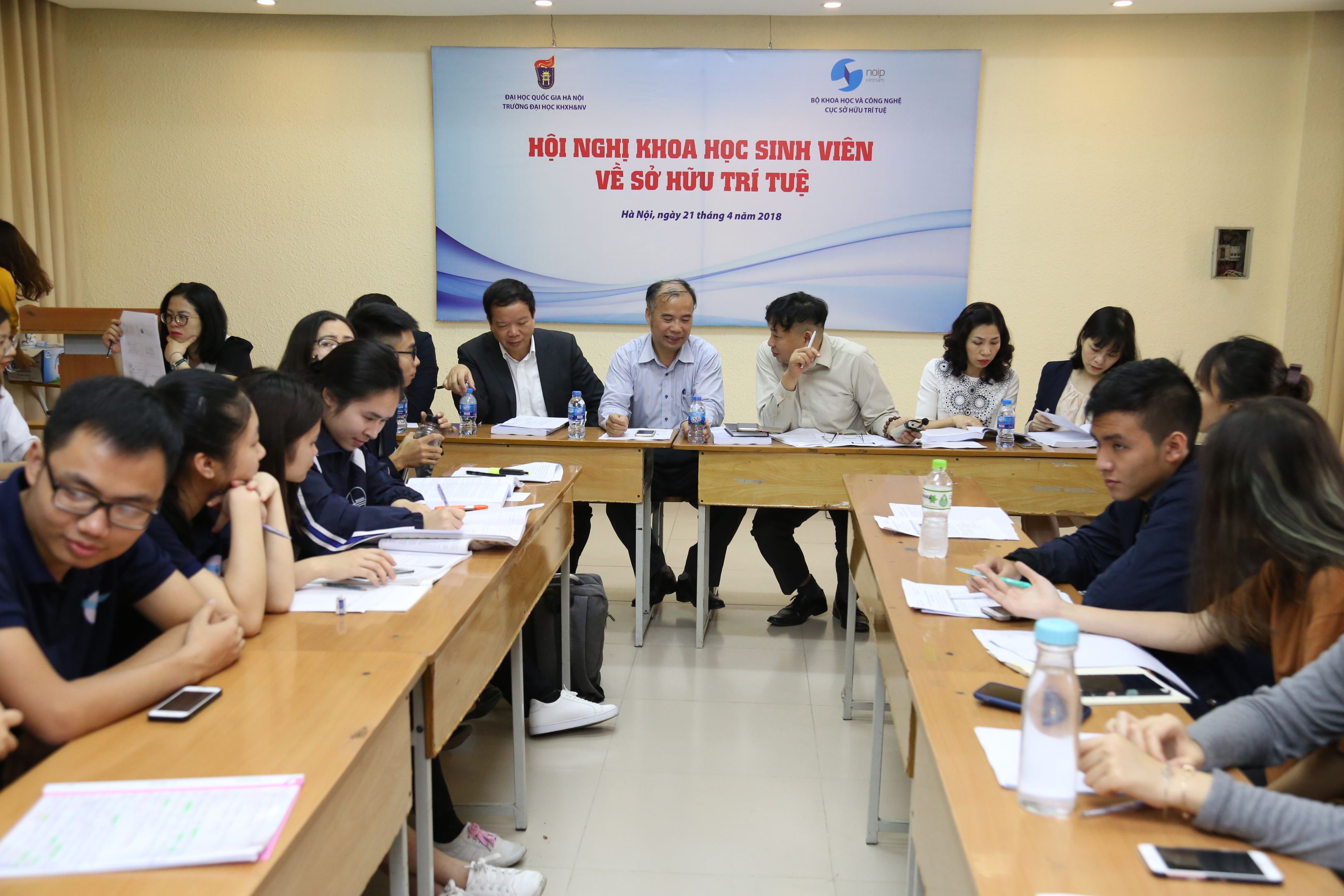
Intellectual Property Research Conference between students of 4 major universities: National Economics University, Hanoi Law University, University of Law (Hue University), Foreign Trade University and University of Social Sciences and Humanities (VNU) April 21, 2018. This is a regular academic activity hosted by the University of Social Sciences and Humanities with the participation of representatives of the Intellectual Property Office.
- How are traditional values reflected in the school's activities, sir?
I believe that in the field of training, especially in social sciences and humanities, a long tradition is an advantage. Since the time of Hanoi University of Science (since 1956), training and research here have formed a school with its own identity. That is the way to train intellectuals who not only have solid foundational knowledge but also have comprehensive, interdisciplinary, and synthetic scientific thinking, and are able to analyze and solve many practical work problems. They are individuals who are independent and creative in thinking and acting...
It is easy to see that graduates from the School are capable of doing a variety of jobs with high adaptability. Literature students can work in the field of research, high-level teaching, or in the field of journalism, editing, playwriting, etc. History students not only teach at universities, colleges or research institutes but also work at cultural and tourism agencies, political and socio-political organizations, non-governmental organizations at home and abroad, etc. The career field of social sciences and humanities is very broad. The School's students are well-trained with a solid knowledge base, so when approaching real life, they are able to adapt and go far in their work and career. This is a traditional feature in training that the School still maintains today.
35% of students do internships and practical training abroad
- But a long-standing and well-established university may have difficulty in being dynamic and adaptable when competing with young universities?
The school considers tradition as a system of good values that need to be preserved and further enhanced in the new situation, but it is not allowed to rely on the past or depend on tradition. The depth of tradition needs to become a solid foundation for the school's staff and students to confidently step into the future. Therefore, the school has been making efforts to continue to innovate more strongly, in all aspects, from the macro level of development strategy, orientation of modern university management to specific professional activities in teaching, learning materials, programs, training processes, participating in quality assessment activities of training majors according to national and international standards...
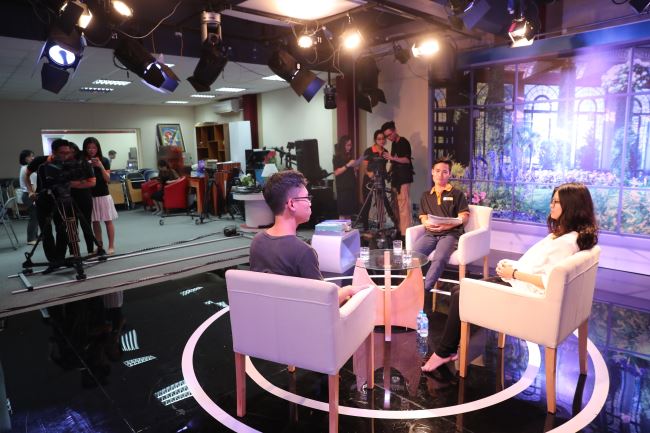
Students of the Faculty of Journalism and Communication practice working in a modern studio system comparable to a television station.
- Could you please share about the output quality criteria of training products to meet the requirements of the current labor market?
The current labor market is very open, not only domestically but also internationally. This reality requires workers to not only have solid professional knowledge but also good skills and a strong mindset to be able to meet new requirements in the new context. The school is clearly aware of this and is particularly interested in adjusting training activities to keep up with this trend.
Innovation in the training activities of the School takes place simultaneously in many aspects, from innovation in training management methods towards professionalism, modernity, bringing high service spirit to teaching and learning activities... to the requirement to update/open new training programs to suit the knowledge trends of humanity. Basically, the School's teaching staff is always proactive in updating and adjusting the curriculum to provide students with new knowledge, especially new approaches to ensure the quality of human resources after graduation.
The school is currently investing heavily to further improve the quality of training, aiming at producing bachelors as the output product.solid expertise - solid skills - strong integrationFor example, graduates of Korean studies, Japanese studies, etc. are not only very good at languages, but also have deep and extensive knowledge of the history, culture, country and people, economy, society, etc. of that country. Similarly, graduates of tourism majors are not only proficient in basic professional skills, but also have to have comprehensive thinking, a broad and solid knowledge base, etc. to be able to plan national tourism strategies and participate in the international tourism market.
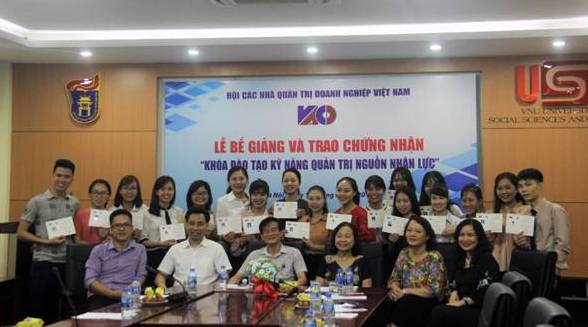
Students of the University of Social Sciences and Humanities participate in a course on human resource management skills training organized by the University and the Vietnam Association of Business Administrators (June 18, 2018)
With the goal of developing skills for students, the School is currently striving to create activity spaces and training environments to support the development of specialized skills for students. The School currently has a diverse system of strong specialized clubs such as the Media Club, Photography Club, Art Club (dance, music, etc.), Cultural and Historical Propaganda Club, Young Managers Club, English Club, etc. By actively participating in these clubs, students learn both professional and operational skills and specific experiences. For example, students majoring in Journalism participate in reporting and building communication products for the School; students majoring in Tourism participate in activities to promote and develop tourism in Hanoi; students majoring in International Studies are the focal point for exchange activities with international students; students majoring in Office Administration participate in activities with functional departments to perfect their skills and expertise, etc.
In order to prepare students for integration, the School is investing in providing them with opportunities to do internships and practical training in international locations before graduation. In addition to the stable number of students receiving scholarships to study abroad for short or long terms each year, in recent years, the School has taken advantage of its extensive international relationships to organize internships and practical training abroad for students at very low costs. In 2017, the number of students studying and doing internships and practical training abroad reached nearly 450 (along with more than 1,000 foreign students coming to study and do internships at the School, creating a vibrant international academic environment). Students who do international internships not only have good experiences in terms of knowledge, but especially broaden their horizons, arouse their confidence in integration, and create a mindset ready to participate in the cross-border labor market. In particular, many students after their internships have received scholarships to study for master's degrees at partner schools from China, Thailand, Taiwan, etc. The goal of the School is to continue to promote international internship activities for students, striving for about 35% of the School's students to experience an international internship environment before graduating and going to work.
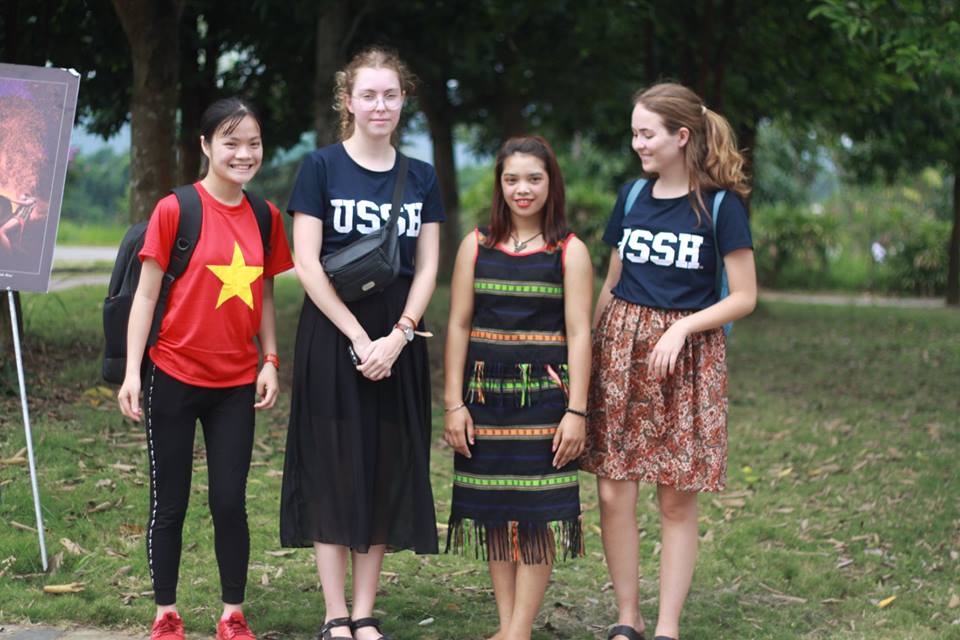
Students of University of Social Sciences and Humanities exchange with international students
- International integration is a criterion of university training today, how is this reflected in the training activities of the School, sir?
When it comes to international integration, the key issue is the ability to use foreign languages, especially English. It is easy to see that the ability to use foreign languages of the University's students has increased rapidly in recent times thanks to the increasingly open international environment. In addition to the annual international internship and practice activities as mentioned above, the University is also making efforts to build an international learning environment right on the spot: many international scientific conferences, many on-site exchange and cooperation activities, foreign language clubs, etc.
For the past two years, each semester, the School has regularly opened foreign language classes taught directly by both international guest lecturers and lecturers of the School for students to choose to study. The Master's Tea Club for students was established in 2017 and has increasingly attracted students to participate in its activities. In particular, in an effort to improve international standard foreign language skills for the School's students, since the beginning of 2018, the School has cooperated with non-governmental organizations specializing in education to organize free foreign language classes taught directly by international volunteer teachers and trained for students. After half a year of implementation, nearly 20 classes have been organized with about 300 students registered to study. These courses last 7 to 10 consecutive weeks, meet international language training standards (for IELTS) and are completely free... Based on the upgraded foreign language level, more and more students (and graduate students) of the School write their theses and graduation theses in English. These are advantages for them to confidently start a career and develop.
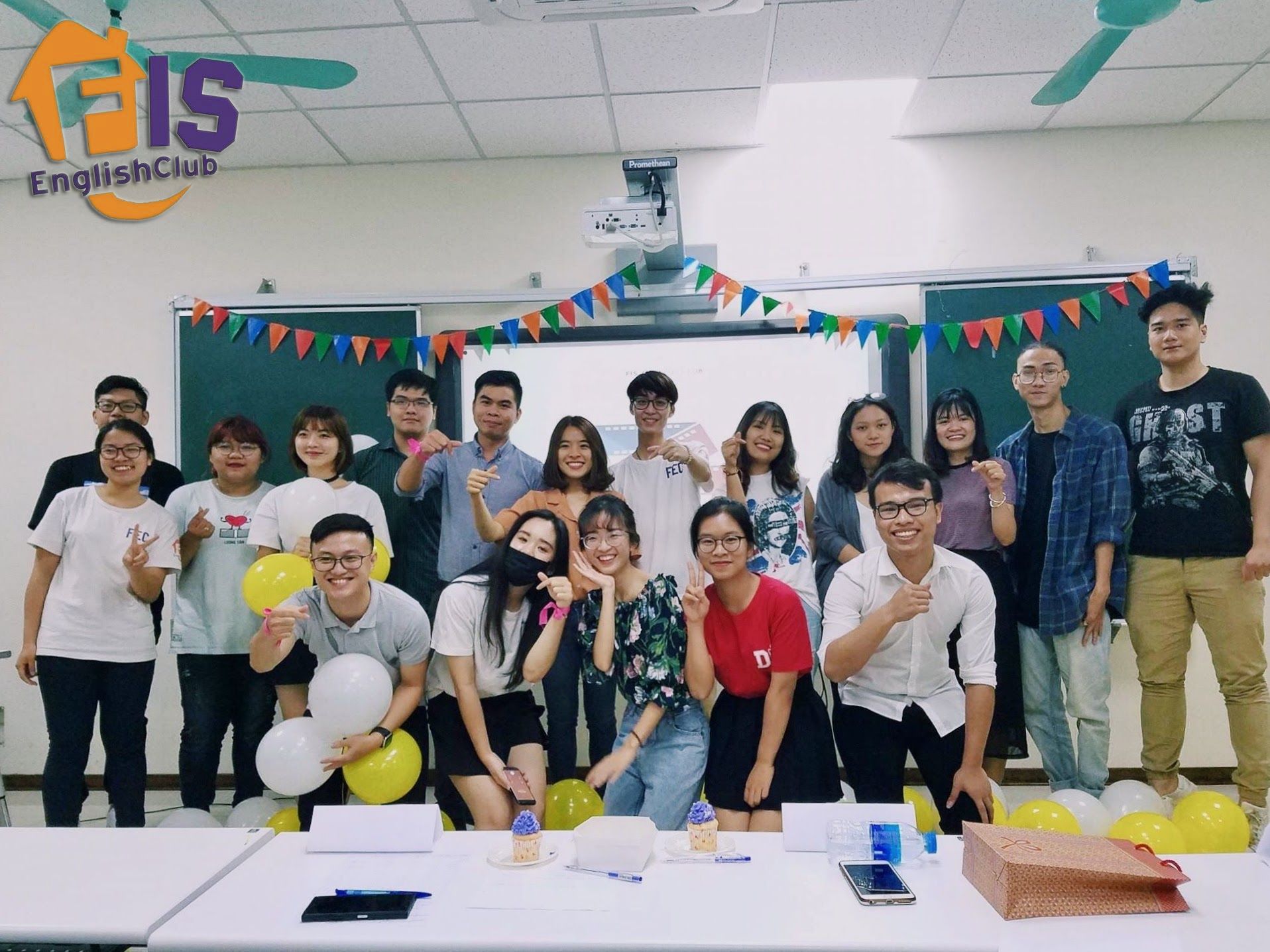
A meeting of the FIS English Club of the Faculty of International Studies (May 2018)
25%Graduatesearly
- How does the school care about career guidance and employment for students, sir?
Last June, the school organized a job fair right after the graduation ceremony with the participation of 30 career agencies, companies and businesses, providing nearly 500 job opportunities for new graduates. After the graduation ceremony, students immediately participated in interviews, many of whom were recruited on the morning of graduation. Four months earlier, during the early graduation ceremony in 2018, more than 250 students were also invited to meet with 22 recruitment agencies, providing nearly 300 job opportunities.
Objectively speaking, the coordination between the School and the employer does not wait until graduation but is implemented regularly throughout the training process. For example, the construction of the School's training programs has involved outside experts from the beginning. Researchers and entrepreneurs participate in the construction of training programs, participate in teaching and guidance activities, participate in the evaluation and grading councils... and participate in recruiting and using human resources. For example, Dr. Ta Bich Loan (Head of the production department of entertainment programs VTV3, Vietnam Television) is also the Head of the Department of Radio and Television at the Faculty of Journalism and Communication, directly responsible for the construction and innovation of training programs, directly teaching and guiding students of the Journalism major... This is the direction that the School has identified, persistently pursued and determined to promote further in the coming time.
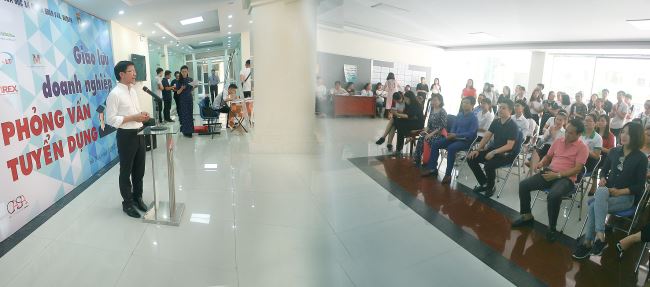
Business Exchange Day and Recruitment Interview right after the graduation ceremony with the participation of more than 30 businesses in many fields (June 2018)
- Students and parents are very interested in training time and employment rate after graduation. What is the current situation at the school, sir?thuh?
In the past few years, the School has innovated the training organization process towards the modern direction of the credit training model. Accordingly, students are completely proactive in arranging their training schedule and deciding their study time. The Faculty and the Training Department regularly advise students on how to organize their study most effectively. Therefore, since 2017, the number of students graduating early has been increasing. Of the more than 1,000 students receiving bachelor's degrees in the first half of 2018, more than 250 students graduated 6 months ahead of schedule. Thus, the rate of students graduating on time is equivalent to 95%, of which about 25% of students graduated 6 months ahead of the standard training schedule, and some students graduated from university after only 3 years.
Graduation on time and early is entirely up to the student’s initiative. For example, by simply registering for 2 summer semesters, students can completely graduate from university after 3.5 years; if students register for 2 summer semesters, simultaneously study a few extra credits each semester and are exempted from foreign language studies (when they have an international foreign language certificate), they can completely finish their university training program after 3 years. This is completely natural according to the credit training model in the world and also in line with the direction of training innovation by Prime Minister Nguyen Xuan Phuc since the end of 2016.
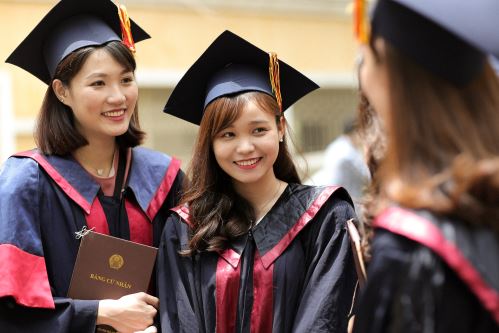
New students of the University of Social Sciences and Humanities show off their radiant looks at the graduation ceremony in June 2018
The good news is that the number of students graduating on time and before the deadline has increased, the training quality is still guaranteed, and the employment rate is stable. For nearly 10 years now, the School has proactively investigated the employment rate of students of all courses after graduation. In 2015, 2016 and 2017, the rate of students having jobs after 6 to 12 months has always reached an average of 90% to 93%. In some majors such as Oriental Studies, Tourism and Travel Services Management, Hotel Management, Journalism, etc., the employment rate after graduation is 100%, and many students are even recruited right after their graduation internship. Some international corporations from Japan, Korea, China, etc. often wonder why the School does not increase the number of Oriental students trained every year because they want to recruit but the School does not provide enough human resources. Not only in applied fields but also in many basic sciences, the employment rate after graduation is also very stable thanks to the small number of annual training while the training quality is guaranteed. For example, students majoring in Archaeology at the University are always notified of recruitment by provincial agencies (Museums, Department of Culture, Monuments Management Board, etc.), but usually students have found jobs during their graduation internship.
- Thank you very much for sharing.
Author:Thanh Ha
Newer news
Older news